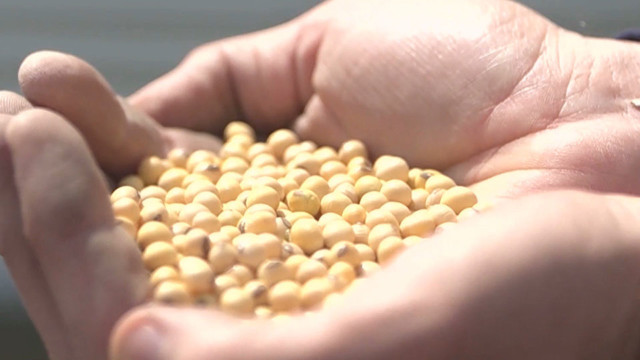If a trade war sparks between the U.S. and China, the state of Iowa stands to lose more than most. It’s a top agricultural region, leading in corn, soybean and pork production.
As CGTN’s Dan Williams reports, farmers there have deep concerns about the trade dispute.
The Kimberley farm in Iowa is a symbol of U.S.-China farming relations. It is here where Chinese President Xi Jinping, then the vice-president, paid a visit in 2012, to experience an example of a model U.S. farm.
Rick Kimberley, who hosted the China delegation, is amongst a growing number of concerned farmers.
The Trump administration’s decision to impose tariffs on China, led to China then imposing tariffs on a range of U.S. products.
The list includes a 25 percent tariff on soybeans and pork and that has alarmed producers in Iowa.
“It has been a long process and something that we cherish as farmers, the relationship we have built over there in China,” said Kimberley. “So we are concerned about it. And we don’t want anything to damage this relationship we do have.”
Rick’s son, Grant is the Director of Market Development at the Iowa Soybeans Association. He has no doubt about the potential severity a trade war would have on Iowa farming.
“Certainly if this were to continue on for a long you are going to see impacts on prices,” said Kimberley. “That would put financial pressure on farmers and I would think that over time you would see challenges for farmers who may even have to file bankruptcy if this were to go on for very long.”
That view is echoed by Dave Struthers, who owns a nearby hog and soybean farm.
“Anytime you operate a business at a loss, you can only sustain it for so long,” said Struthers. “And there are many farms that can be put into a financial pinch that they don’t see any light at the end of the tunnel and they will have to throw in the towel.”
The Iowa Farm Bureau estimates that agriculture and its related industries bring $112.2 billion into Iowa’s economy each year.
The importance of farming for the Iowa economy is clear and accounts for one in five jobs in the state. Exports are a key part of that.
U.S. soybean exports to China are worth in the region of $14 billion. So these tariffs threaten to undermine the industry.
Many farmers here are demanding that the White House changes course.
“I want to tell the Trump administration that we are the people who put you here, in rural America, and we are very concerned about things happening to us,” said Struthers. “Why do you hurt agriculture? We do not have a trade deficit in agricultural products and you are trying to hurt us for a small gain in a segment of the economy.”
There is a cloud hanging over farmers here. Many hope politicians will change direction and avoid a trade war. Or else, they fear they will be the ones counting the cost.
Manuel Suarez-Mier discusses global perceptions of Us & China’s tit-for-tat tariffs
CGTN’s Elaine Reyes spoke to trade analyst Manuel Suarez-Mier. He’s a Latin America economic consultant and former Chief of Staff of the Governor of the Bank of Mexico.
 CGTN America
CGTN America

